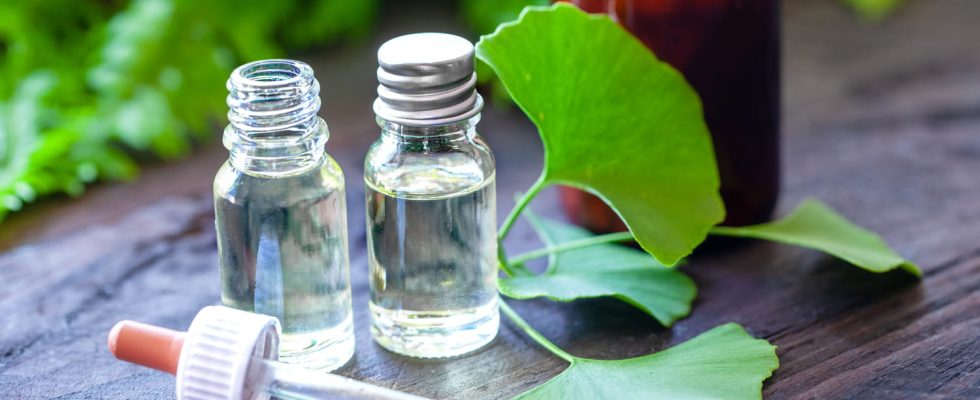Originally from southern China, ginkgo biloba is a tree known for its benefits on the brain, memory, blood circulation and tinnitus. But you have to know its contraindications to use it without risk.
THE ginkgo biloba is the last representative of the ginkgoaceae family. it’s about the oldest family of trees since it already existed long before the appearance of the dinosaurs. It can reach 50 meters in height and live up to a thousand years. “Sacred tree in Japan and China, it is also known as “d’maidenhair tree“, price at which it was purchased in 1788explains Sylvie Hampikian, an expert pharmacologist in herbal medicine. Due to its shiny leaves like so many gold coins, it then became “the thousand crown tree“.
Parts of the plant used
It is mainly its leaves that are used because they concentrate much more active ingredients.
What are the benefits of ginkgo biloba?
The effectiveness of ginkgo leaves is recognized as clinically proven by the World Health Organization. The traditional use of ginkgo is also recognized by the European Scientific Cooperation in Phytotherapy (ESCOP). He is part of medicinal plants registered in the list of the French Pharmacopoeia.
► Neuroprotector, ginkgo biloba acts on the brain. Its leaves are used to treat the symptoms of senile dementia and states of weakness such as memory loss, depression, concentration and vigilance disorders, tinnitus or even headaches.
► Venotonic, it acts on the vascular system and relieves superficial phlebitis thanks to an anticoagulant action, hemorrhoids, varicose veins, Raynaud’s disease and intermittent claudication.
► It has healing properties.
Is ginkgo good when doing sports?
“Several studies have shown that ginkgo biloba can improve performance and endurance, explains Sylvie Hampikian. To be taken in combination with other natural food supplements, such as Rhodiola and creatinewhich have the property of improving oxygenation, reducing fatigue and protecting against oxidative stress“. There are no known adverse effects in this context.
What are the dangers and contraindications of ginkgo biloba?
By his thinning action on the blood, the gingko is contraindicated during pregnancy or breastfeeding. “In case of surgery, it is recommended to stop treatment at least 48 hours before. It is not recommended to combine ginkgo with certain anticoagulant drugs as the warfarin and aspirin, antiepileptics, antidiabetics and antidiuretics“, warns the pharmacologist.
Be careful, ginkgo thins the blood.
- In herbal tea and decoction, use between 20 and 40 g of dried leaves for one liter of water. Leave to infuse for 5 minutes before filtering and drinking a cup a day.
- In capsules, opt for those dosed with more than 500 mg of gingko biloba leaf extract. To be taken at the rate of one capsule morning and evening.
- In mother tincture : dilute between 20 and 40 drops in a glass of water, 2 to 3 times a day
What are the side effects of ginkgo?
The appearance of side effects linked to the consumption of ginkgo remains extremely rare. THE digestive disorders like stomachaches, headache and skin allergies are among the possible reactions itching, hives). Before taking anything, ask your doctor or pharmacist for advice.
Medicines containing gingko biloba
- Ginkgo Biogaran 40mg
- Ginkgo EG Labo Conseil 40 mg
- Ginkgo Zentiva 40mg
- Ginkor Fort Capsule
- Tanakan 40 mg/ml oral solution
- Vitalogink 40mg
Thanks to Sylvie Hampikian, pharmacologist expert in herbal medicine.
